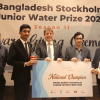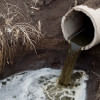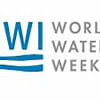Bangladeshi student creates water purifier from e-waste

Zabeer Zarif Akhter, a 17-year-old Bangladeshi student from St. Joseph Higher Secondary School, has secured the national title in the Stockholm Junior Water Prize competition. His water purification system, crafted from recycled electronic waste, aims to tackle water pollution and waterborne diseases while promoting environmental responsibility.
Zabeer's invention, the "high voltage plasma water purifier", is built to "eradicate all types of microbiological contaminants and break the double and triple bonds of organic compounds," according to Zabeer. This translates to cleaner water free of bacteria and potentially harmful organic materials. "It can be deployed for individual use in flood-prone areas of Bangladesh to decontaminate water from bacteria and reduce the impact of waterborne diseases," he elaborates.
Instead of relying on expensive, specialised components, Zabeer says his purifier is built from readily available electronic waste. "All the components, including batteries, are collected from electronic waste, such as three-wheeler motor driver circuit parts, old CRT TV materials, abandoned laptops, and mobile lithium batteries," he explains.
As per the young inventor, this not only reduces the overall cost of the purifier but also promotes a solution for managing Bangladesh's growing e-waste problem. "The project is eco-friendly because the components for this project are collected from electronic waste, which can decrease hazardous material emissions into the environment," he says. To further minimise environmental impact, he states that solar panels can be used to charge this device, significantly reducing its carbon footprint.
Zabeer's drive to innovate stems from concerns for his community's well-being. "Industrial wastewater and textile dyes are significant pollutants that contaminate water and soil, leading to increased carcinogenic materials in both," he mentions. Furthermore, Bangladesh's frequent floods pose a significant threat to public health. "Floods pose a significant challenge during the rainy season, causing widespread suffering and loss of life due to waterborne diseases," he notes.
Zabeer's win in the national round grants him a fully-funded trip to Stockholm, Sweden, to compete in the international leg of the Stockholm Junior Water Prize.

 For all latest news, follow The Daily Star's Google News channel.
For all latest news, follow The Daily Star's Google News channel. 








Comments